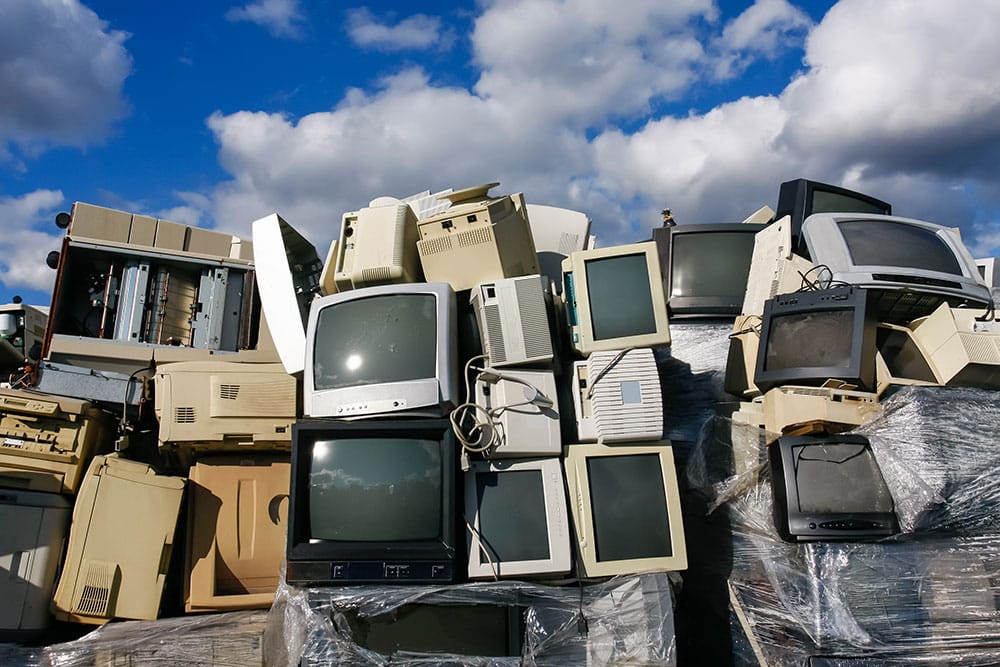 If you’re thinking about tossing out an old television or computer monitor, you might have to do some research into acceptable ways to discard these items. These electronic devices are considered e-waste and could potentially cause damage to the environment as well as sanitation workers if not properly recycled.
If you’re thinking about tossing out an old television or computer monitor, you might have to do some research into acceptable ways to discard these items. These electronic devices are considered e-waste and could potentially cause damage to the environment as well as sanitation workers if not properly recycled.
Heavy metals such as cadmium, lead, and mercury seep out of these electronics and into the environment, potentially polluting our drinking water. These metals never decompose so they remain a constant threat to the environment. Half of U.S. states are beginning to ban the disposal of e-waste and require that it be recycled instead.
Laws regarding e-waste exists in many states, including:
- South Carolina
- Pennsylvania
- Maryland
- North Carolina
- New Jersey
- Virginia
Click here to check out the whole list.
How Do I Know Whether Something is E-Waste?
You may still be wondering, exactly what is e-waste? By definition, e-waste is any obsolete or unwanted electronic device to be discarded. This includes but is not limited to the following:
- Televisions
- Laptops
- Computer Monitors
- Tablets
- Keyboards
- Printers
- Audio Equipment
- MP3 Players
- Cell Phones
Depending on your area, some of these items may be exempt from the recycling law. You can usually find specific information on your state’s recycling page. However, each item on this list contains materials that are hazardous to the environment. Technology advances at such a rapid rate, so the lifespan of computers and cell phones are quickly diminishing. This is leaving more e-waste to sit in our landfills.
The Proper Way to Discard E-Waste
When sanitation workers incinerate e-waste items, they release dangerous gases into the air. Additionally, most e-waste contains bits of aluminum, tin, gold, and copper that can serve as secondary raw materials if properly recycled. Typically, you’re able to recycle these items by taking them to drop off locations or collection events. If caught illegally dumping e-waste, you could face thousands in fines.
Currently, e-waste makes up only about two percent of the solid waste stream, but it is the quickest growing component and is responsible for up to 70 percent of heavy metal waste in our landfills. According to the Consumer Electronics Association, the average American household has 24 electronic devices that will eventually become e-waste. The world produces about 50 million tons of e-waste each year. Even developing countries are contributing to this number.
Why It’s Important
In order to protect the environment as well as future generations, it is becoming necessary that we dispose of electronic devices responsibly. If you’re still not convinced, you should consider where e-waste ends up — some of it is exported across the world, creating environmental problems all over.
Properly recycling electronic waste will help to preserve energy and drinking water while reducing pollution and greenhouse gas emissions. According to the United States Environmental Protection Agency, recycling one million laptops saves the energy equivalent to the electricity used by 3,657 US homes in a year. Recycling will also save the United States millions by recycling natural resources used in electronics rather than having to extract more gold and copper.
Visit our Death of a Cell Phone post to read more about the dangers that cell phones can pose to the environment once they become e-waste. We also encourage you to do your best to not only follow proper waste disposal laws, but to make environmentally conscious decisions.